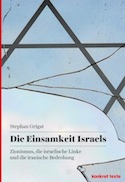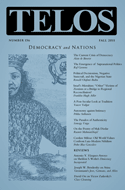By Telos Press · Thursday, January 21, 2021 In today’s episode of the Telos Press Podcast, Camelia Raghinaru talks with Menachem Fisch about his article “The Tragic Paradox of Political Zionism,” from Telos 192 (Fall 2020). An excerpt of the article appears here. If your university has an online subscription to Telos, you can read the full article at the Telos Online website. For non-subscribers, learn how your university can begin a subscription to Telos at our library recommendation page. Purchase a print copy of Telos 192 in our online store.
Listen to the podcast here.
Continue reading →
By Arno Tausch · Tuesday, May 19, 2015  Die Einsamkeit Israels: Zionismus, die israelische Linke und die iranische Bedrohung (Israel’s Solitude: Zionism, the Israeli Left, and the Iranian Threat), by the German political scientist Stephan Grigat, is an important contribution to the overall debate on the Middle East, and it was published just in time, given the background of the Lausanne negotiations with Iran. Grigat dispels the current euphoria about the “breakthrough in Lausanne” and illuminates the many existing darker sides of the Lausanne deal. The present reviewer is of the opinion that, particularly in view of the special historical responsibility of Continental Europe, a careful reconsideration of the realities created in Lausanne and the considerable role played by the EU foreign policy machinery is necessary and that the other side in the conflict—the side of Israel—is also being heard. Die Einsamkeit Israels: Zionismus, die israelische Linke und die iranische Bedrohung (Israel’s Solitude: Zionism, the Israeli Left, and the Iranian Threat), by the German political scientist Stephan Grigat, is an important contribution to the overall debate on the Middle East, and it was published just in time, given the background of the Lausanne negotiations with Iran. Grigat dispels the current euphoria about the “breakthrough in Lausanne” and illuminates the many existing darker sides of the Lausanne deal. The present reviewer is of the opinion that, particularly in view of the special historical responsibility of Continental Europe, a careful reconsideration of the realities created in Lausanne and the considerable role played by the EU foreign policy machinery is necessary and that the other side in the conflict—the side of Israel—is also being heard.
Continue reading →
By Franklin Hugh Adler · Wednesday, October 5, 2011 Franklin Hugh Adler’s “Israel’s Mizrahim: ‘Other’ Victims of Zionism or a Bridge to Regional Reconciliation?” appears in Telos 156 (Fall 2011). Read the full version online at the TELOS Online website, or purchase a print copy of the issue here.
 Mizrahim, Jews who issued from Arab lands, comprise roughly half of Israel’s population. Most arrived after having been expelled from Arab states after 1948, and in number exceed those Palestinians who were displaced at Israel’s birth. They also possessed substantially greater property that was confiscated without compensation upon expulsion. Mizrahim have had a largely ignored and uneasy relation with Zionism, whose master narrative was based upon the return of European Jews to Palestine. An orientalist, anti-Arab blindness that became embedded in Zionism also encouraged a deracination of Mizrahim, as they, too, were Arabs and had been an enduring presence in the region predating by centuries the birth of Mohammad and the ascendance of Islam. In recent years there has been a reassertion of Mizrahi identity, often articulated by subsequent generations, which, at the same time, might become a source of regional reconciliation and help redeem the pluralism and cultural hybridity that once characterized Mediterranean-Levantine civilization. This essay attempts to explore these imaginative possibilities. Mizrahim, Jews who issued from Arab lands, comprise roughly half of Israel’s population. Most arrived after having been expelled from Arab states after 1948, and in number exceed those Palestinians who were displaced at Israel’s birth. They also possessed substantially greater property that was confiscated without compensation upon expulsion. Mizrahim have had a largely ignored and uneasy relation with Zionism, whose master narrative was based upon the return of European Jews to Palestine. An orientalist, anti-Arab blindness that became embedded in Zionism also encouraged a deracination of Mizrahim, as they, too, were Arabs and had been an enduring presence in the region predating by centuries the birth of Mohammad and the ascendance of Islam. In recent years there has been a reassertion of Mizrahi identity, often articulated by subsequent generations, which, at the same time, might become a source of regional reconciliation and help redeem the pluralism and cultural hybridity that once characterized Mediterranean-Levantine civilization. This essay attempts to explore these imaginative possibilities.
Continue reading →
|
|
 Die Einsamkeit Israels: Zionismus, die israelische Linke und die iranische Bedrohung (Israel’s Solitude: Zionism, the Israeli Left, and the Iranian Threat), by the German political scientist Stephan Grigat, is an important contribution to the overall debate on the Middle East, and it was published just in time, given the background of the Lausanne negotiations with Iran. Grigat dispels the current euphoria about the “breakthrough in Lausanne” and illuminates the many existing darker sides of the Lausanne deal. The present reviewer is of the opinion that, particularly in view of the special historical responsibility of Continental Europe, a careful reconsideration of the realities created in Lausanne and the considerable role played by the EU foreign policy machinery is necessary and that the other side in the conflict—the side of Israel—is also being heard.
Die Einsamkeit Israels: Zionismus, die israelische Linke und die iranische Bedrohung (Israel’s Solitude: Zionism, the Israeli Left, and the Iranian Threat), by the German political scientist Stephan Grigat, is an important contribution to the overall debate on the Middle East, and it was published just in time, given the background of the Lausanne negotiations with Iran. Grigat dispels the current euphoria about the “breakthrough in Lausanne” and illuminates the many existing darker sides of the Lausanne deal. The present reviewer is of the opinion that, particularly in view of the special historical responsibility of Continental Europe, a careful reconsideration of the realities created in Lausanne and the considerable role played by the EU foreign policy machinery is necessary and that the other side in the conflict—the side of Israel—is also being heard.  Mizrahim, Jews who issued from Arab lands, comprise roughly half of Israel’s population. Most arrived after having been expelled from Arab states after 1948, and in number exceed those Palestinians who were displaced at Israel’s birth. They also possessed substantially greater property that was confiscated without compensation upon expulsion. Mizrahim have had a largely ignored and uneasy relation with Zionism, whose master narrative was based upon the return of European Jews to Palestine. An orientalist, anti-Arab blindness that became embedded in Zionism also encouraged a deracination of Mizrahim, as they, too, were Arabs and had been an enduring presence in the region predating by centuries the birth of Mohammad and the ascendance of Islam. In recent years there has been a reassertion of Mizrahi identity, often articulated by subsequent generations, which, at the same time, might become a source of regional reconciliation and help redeem the pluralism and cultural hybridity that once characterized Mediterranean-Levantine civilization. This essay attempts to explore these imaginative possibilities.
Mizrahim, Jews who issued from Arab lands, comprise roughly half of Israel’s population. Most arrived after having been expelled from Arab states after 1948, and in number exceed those Palestinians who were displaced at Israel’s birth. They also possessed substantially greater property that was confiscated without compensation upon expulsion. Mizrahim have had a largely ignored and uneasy relation with Zionism, whose master narrative was based upon the return of European Jews to Palestine. An orientalist, anti-Arab blindness that became embedded in Zionism also encouraged a deracination of Mizrahim, as they, too, were Arabs and had been an enduring presence in the region predating by centuries the birth of Mohammad and the ascendance of Islam. In recent years there has been a reassertion of Mizrahi identity, often articulated by subsequent generations, which, at the same time, might become a source of regional reconciliation and help redeem the pluralism and cultural hybridity that once characterized Mediterranean-Levantine civilization. This essay attempts to explore these imaginative possibilities. 

